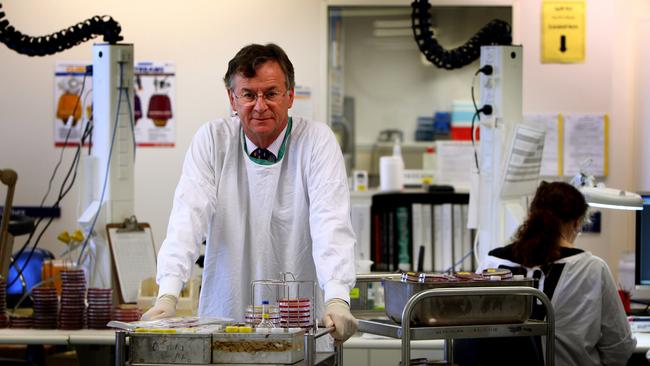Poo detectives trace COVID virus as early warning sign
Coronavirus sheds in faeces so testing sewage may become an early warning sign to identify new hot spots. The poo detectives may be the best early defence to avoid community spread.

NSW
Don't miss out on the headlines from NSW. Followed categories will be added to My News.
WE need to hire an army of “poo detectives” because it will help NSW sniff out COVID-19 outbreaks and could save us from going down the toilet like Victoria.
Scientists have discovered that infected people “shed” the virus in their faeces and NSW has begun a limited surveillance program to test for COVID-19 in untreated sewage in four regional health districts.
But infectious disease expert Professor Peter Collignon said the program needs to be dramatically ramped up, with daily testing and reporting.
“Rather than doing testing of asymptomatic people, we need poo detectives and we need the results not sat on, it needs to be done daily and reported,” he said.
”Sewage testing is very important because that tells you whether there is COVID in the community above a certain level.
“Testing sewage gives us the best ongoing surveillance, knowing when we have a problem potentially with significant community transmission.
“It’s an early warning sign.
“At low levels you don’t pick it up — in Canberra for instance, we have been doing it for a couple of months.
“There’s 500,000 people here and at one stage we had five people with infection and we didn’t pick it up in sewage.
“But if you are starting to get it in sewage, that is a signal there is a problem in an area.

“That is the advantage of sewage, it tells you where you need to target and put in effort as opposed to locking down a whole state.”
Asymptomatic COVID-19-infected people “shed” as much of the virus in their faeces as symptomatic patients, a new study published in JAMA Internal Medicine journal found.
A Dutch study conducted on seven cities in the Netherlands in March showed virus fragments were detected in sewage of five sites.
“The detection of the virus in sewage, even when the COVID-19 incidence is low, indicates that sewage surveillance could be a sensitive tool to monitor the circulation of the virus in the population,” the researchers concluded in their recently published study.
Professor Raina Macintyre, who heads the Biosecurity Program at the Kirby Institute, said sewage testing could more accurately detect prevalence.
“There is a lot of asymptomatic infection and mild infection, so it can give you an early signal if there is a lot of disease around,” she said.
“One study in Massachusetts, they knew how much disease was being notified but when they tested the sewage they found there was a lot more disease than was being notified.”
NSW began sewage sampling last month at 17 sites at sewage treatment plants in four regional Local Health Districts: Murrumbidgee, Southern NSW, Hunter New England and Northern NSW.
Samples collected at the Perisher sewage treatment plant on Wednesday July 22 returned a positive result for COVID-19.
“When viral fragments are detected, this tells us that one or more people in the sewage catchment area may be excreting the virus,” a spokeswoman for NSW Health said.
“A positive SARS-CoV-2 sewage result can potentially provide an early warning of possible virus introduction in areas where transmission had not previously been detected.
“This additional source of information can, and has, been used to drive testing or enhanced contact tracing.”
